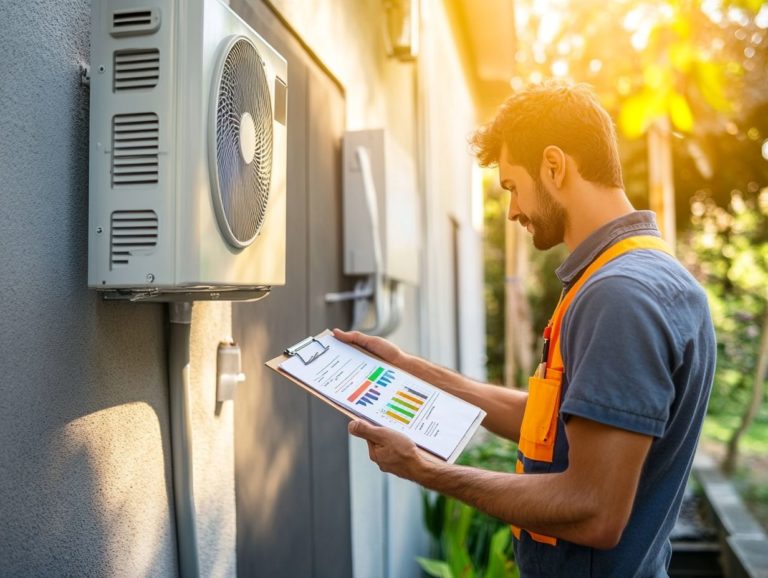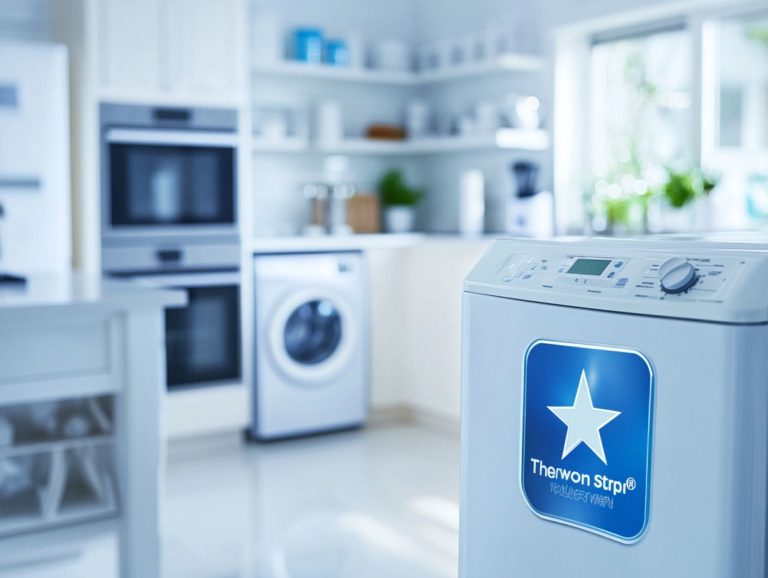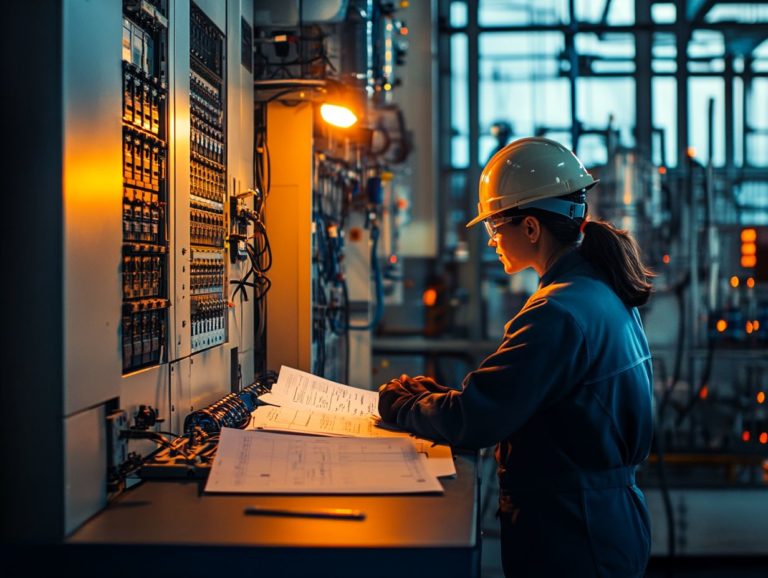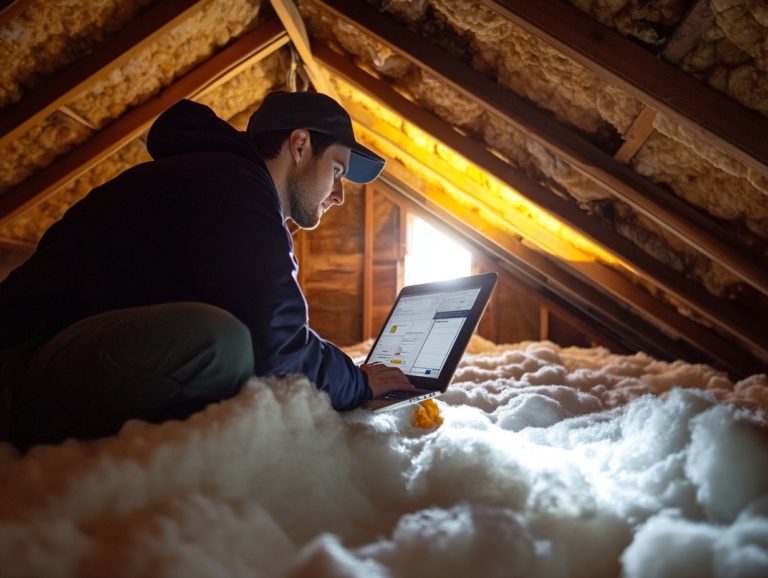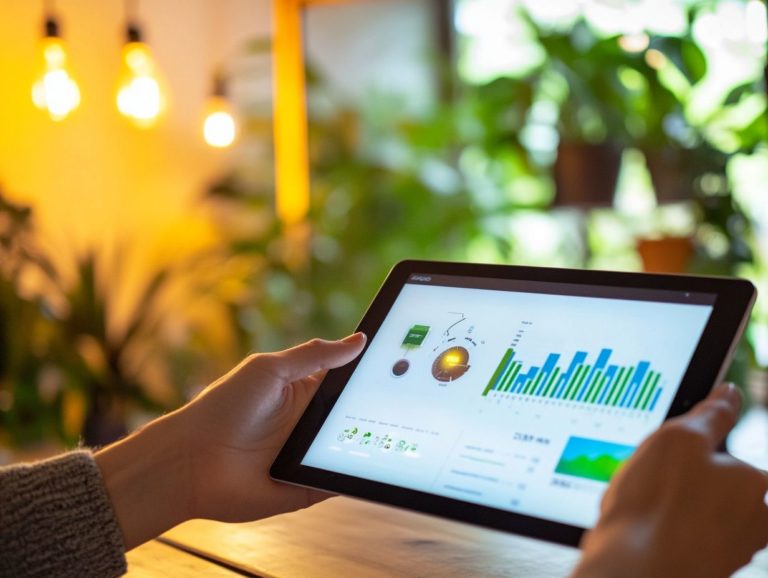5 Innovative Solutions from Energy Audits
In today s world, energy conservation is more important than ever. Grasping the intricacies of optimizing energy use can lead to remarkable savings and significant environmental benefits. Start saving today!
This article delves into five innovative solutions revealed through energy audits, such as smart thermostats, LED lighting, energy-efficient appliances, solar panels, and insulation upgrades.
You ll learn how energy audits operate, the different types available, their benefits, and how both businesses and homeowners can embark on their journey toward enhanced energy efficiency.
Discover practical strategies to cut costs and boost sustainability.
Contents
Key Takeaways:

Upgrade to smart thermostats to optimize energy usage and save money on utility bills. Switch to LED lighting for energy-efficient and long-lasting lighting solutions. Consider investing in energy-efficient appliances to reduce energy consumption and save money in the long run.
1. Smart Thermostats
Smart thermostats are a great tool designed to improve energy efficiency in your home by skillfully managing heating and cooling systems. By doing so, they help you reduce energy consumption and lower those pesky energy bills, making them an essential asset for anyone looking to implement energy-saving enhancements.
These advanced devices utilize sophisticated algorithms and machine learning, paired with user-friendly interfaces. They design personalized heating and cooling schedules that align perfectly with your lifestyle. By seamlessly integrating with your existing HVAC systems, they maintain a comfortable environment while cutting down on unnecessary energy use.
Many models have smart sensors that detect occupancy, automatically adjusting settings to prevent energy waste in unoccupied rooms. You can also keep an eye on your energy usage through intuitive mobile apps, enabling you to make informed decisions about your consumption habits and pinpoint additional areas for savings.
2. LED Lighting
LED lighting represents a transformative leap in energy-efficient solutions, significantly curtailing energy consumption while also reducing your carbon footprint. Switching to LED lighting not only saves money but also helps the planet.
By swapping out traditional incandescent and fluorescent bulbs for LED alternatives, you can revel in an impressive lifespan that often surpasses 25,000 hours. This means far fewer replacements and lower costs over time. These bulbs consume up to 80% less energy, translating into notable savings on your monthly electricity bills.
Switching to LED lighting promotes a more sustainable lifestyle and contributes to a larger movement toward energy conservation within homes. As more households embrace LED lighting, the collective reduction in energy demand eases the burden on power plants and decreases greenhouse gas emissions.
This shift ultimately nurtures a healthier environment for future generations, making your choice all the more impactful.
3. Energy-Efficient Appliances

Investing in energy-efficient appliances proudly bearing the Energy Star label can significantly reduce your household’s energy consumption. This leads to lower energy bills and supports a more sustainable lifestyle for those committed to energy efficiency.
The array of energy-efficient appliances available includes everything from refrigerators to washing machines and HVAC systems, all designed to consume considerably less power than their traditional counterparts.
For example, an Energy Star-certified refrigerator can use up to 15% less energy compared to a non-efficient model, resulting in notable savings over time. Similarly, modern washing machines equipped with cutting-edge technology typically require about 25% less water and energy than older models.
By choosing such efficient options, you not only contribute to environmental preservation but also reap the immediate rewards of lower monthly energy costs, making it a savvy choice for anyone mindful of their budget.
4. Solar Panels
Rooftop solar panels present a remarkable opportunity for you as a homeowner to elevate your energy efficiency and minimize your carbon footprint. By embracing this sustainable energy source, you can significantly slash your energy bills and gain greater autonomy over your power usage.
When you harness the sun’s energy, you reduce your dependence on traditional fossil fuels. Tax credits and rebates can ease your initial costs, making solar not just a wise choice but a financially savvy one.
Enjoy long-term savings through lower electricity expenses. You also contribute to a cleaner environment by reducing greenhouse gas emissions. Solar energy encourages a more sustainable consumption model, fostering your energy independence and providing resilience against unpredictable utility rates.
As more homeowners adopt this renewable resource, the collective impact grows stronger, propelling our communities toward a greener future.
5. Insulation Upgrades
Upgrading your insulation is a smart move that pays off big! It effectively tackles issues such as drafty windows and poorly insulated areas, both of which can lead to significant energy loss and sky-high energy bills.
Making insulation improvements is essential for optimizing your HVAC system’s performance. You have a range of insulation materials to choose from, including:
- Fiberglass
- Foam board
- Spray foam
- Cellulose
Each material has its own unique advantages. For example, fiberglass is budget-friendly and moisture-resistant. Spray foam excels in air sealing, dramatically boosting thermal performance.
Proper installation of these materials is vital. Gaps and compressed insulation can undermine their effectiveness, ultimately erasing potential energy savings. Regular maintenance is equally important, as insulation can settle or degrade over time, resulting in reduced efficiency.
By ensuring your insulation remains in optimal condition, you can enjoy substantial long-term savings on heating and cooling costs.
How Do Energy Audits Work?

Energy audits involve detailed assessments carried out by professional auditors to evaluate your home s energy performance. They identify areas ripe for improvement and recommend energy-saving measures that can enhance efficiency, ultimately reducing your energy consumption and lowering your bills.
During this comprehensive evaluation, you can expect a detailed examination of insulation, heating and cooling systems, and window efficiency. Auditors often use special cameras that can see heat and blower doors to detect air leaks and pinpoint where enhancements can be made.
It s vital to engage certified professionals for this process. Their expertise guarantees that the audit is precise and in line with the latest energy standards. By gaining a thorough understanding of your home s energy usage patterns, you can identify actionable improvements that may lead to significant savings and create a more comfortable living environment.
What Are the Benefits of Conducting an Energy Audit?
Conducting an energy audit presents a wealth of benefits, including enhanced energy efficiency, reduced consumption, and significant savings on your energy bills. For those seeking assistance, here are 5 local experts for energy audits that can help you make well-informed decisions about your energy usage.
The energy audit process is an invaluable opportunity to uncover wasteful practices that often slip under the radar, such as inefficient appliances and pesky air leaks. By analyzing your energy consumption patterns, you can identify specific areas of inefficiency and prioritize improvements, including 5 vital energy-saving measures that matter most.
This comprehensive evaluation not only reveals potential cost-saving strategies but also lays the groundwork for preparing for an energy audit. This leads to both environmental advantages and a more sustainable lifestyle.
Don t wait start your energy audit now to uncover hidden savings!
What Are the Different Types of Energy Audits?
You ll find several types of energy audits available to suit your specific needs. Level 1 audits provide a straightforward assessment of your energy consumption. More detailed evaluations from trusted organizations like the U.S. Department of Energy and the Residential Energy Services Network cater to particular requirements.
Each type of audit differs in depth and methodology, allowing you to choose an option that aligns perfectly with your energy goals. For instance, Level 2 audits dig deeper into your building’s performance, using advanced tools like thermographic imaging and blower door tests to uncover hidden issues such as drafts or insulation deficiencies.
In contrast, a Level 3 audit offers a comprehensive analysis and modeling, ideal for larger homes or when significant renovations are on the horizon. The right energy audit for you will depend on your concerns and your aspirations for future savings and improvements.
This approach helps you make informed decisions that enhance both efficiency and sustainability.
How Can Energy Audits Help with Energy Conservation?

Energy audits are your key to saving energy and money! They help you pinpoint inefficiencies in your energy consumption while offering actionable recommendations for improvements. Discovering 5 ways energy audits enhance comfort promotes energy efficiency in your home and fosters a culture of sustainability among homeowners like you.
By thoroughly evaluating each area of your home, these audits highlight specific sources of energy waste and provide tailored solutions. For instance, 5 key considerations for energy audits may include upgrading insulation or suggesting smart thermostats, ensuring you receive expert guidance that fits your needs.
The benefits extend beyond immediate cost savings on your utility bills. You’ll gain a deeper understanding of how your energy habits affect the environment. This knowledge enables you to make informed choices and adopt energy-efficient practices, contributing to broader conservation efforts. By acting now, you can start saving money and improving your home s efficiency!
What Are the Potential Cost Savings from Energy Audits?
The potential cost savings from conducting energy audits can be significant. You can uncover hidden financial inefficiencies in your energy bills and explore local energy efficiency resources to implement targeted upgrades that ultimately lower your overall energy costs.
Consider this: a thorough energy audit might reveal that your insulation is less than efficient, resulting in heat loss and inflated heating bills. By following the 5 key steps in conducting energy audits, you could identify areas for improvement, and by investing in better insulation, you could see immediate reductions in your monthly expenses.
These improvements not only lower bills but also boost your home’s value! Installing energy-efficient lighting or smart thermostats cuts down on energy consumption and can deliver a return on investment that pays for itself in just a few years. This translates to long-term savings, all while contributing to a more sustainable living environment.
Start your energy audit today and discover how much you can save!
How Can Businesses and Homeowners Get Started with Energy Audits?
Businesses and homeowners can start energy audits effectively. Research qualified auditors and understand the different energy assessments available.
Compile information about your current energy usage. Include utility bills and details about your existing systems.
Next, create a list of potential auditors. Pay close attention to their qualifications, experience, and reviews from previous clients.
Scheduling consultations is a wise move. It allows you to learn more about each auditor’s approach and establish a productive working relationship.
When ready for the assessment, ensure the premises are accessible. Key personnel should be on-site for a comprehensive evaluation.
This makes it easier to get valuable insights that boost your sustainability goals!
Frequently Asked Questions
What is an energy audit?
An energy audit is a detailed evaluation of a building’s energy use. It examines systems and habits to identify areas for improvement.
What are the benefits of conducting an energy audit?
It can identify energy and cost savings, improve efficiency, and enhance comfort and safety.
What are the 5 innovative solutions from energy audits? The solutions include energy-efficient lighting, HVAC systems, modern appliances, renewable energy sources, and behavioral changes for conservation.
How do energy-efficient lighting and smart controls help?
They save energy by adjusting lighting based on occupancy and natural light, leading to significant cost savings.
What is the significance of upgrading to energy-efficient appliances?
Upgrading can yield major energy and cost savings. New models often use less energy and can be controlled remotely.
How can renewable energy sources like solar panels benefit a building?
Solar panels reduce reliance on traditional energy and lower costs long-term. They also help the environment by reducing carbon emissions.

